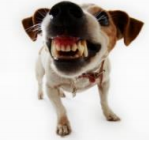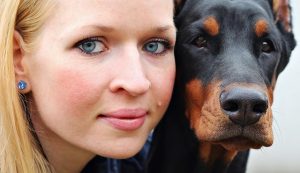 Do you have a puppy or dog that lifts its lip and snarls, growls, bares its teeth, snaps at you or freezes like a statue over its food bowl when you approach? Does the same behaviour apply if you attempt to remove their bone or a toy from their mouth? Does your dog growl at friends if they try to pet your dog whilst you are near or holding them? This is not your dog being protective but a possessive and aggressive behaviour we call Resource Guarding and if left unaddressed can become a very serious problem that can result in severe human injury and euthanasia for your pet.
Do you have a puppy or dog that lifts its lip and snarls, growls, bares its teeth, snaps at you or freezes like a statue over its food bowl when you approach? Does the same behaviour apply if you attempt to remove their bone or a toy from their mouth? Does your dog growl at friends if they try to pet your dog whilst you are near or holding them? This is not your dog being protective but a possessive and aggressive behaviour we call Resource Guarding and if left unaddressed can become a very serious problem that can result in severe human injury and euthanasia for your pet.
What is Resource Guarding?
This is a term used to describe a puppy or dog that becomes particularly possessive of certain objects and becomes aggressive/defensive if anything comes close to the object whilst in the dog’s possession. The reason for this is that the dog values what it is resourcing highly, and in essence, wants to ensure the item in their possession is kept safe.
 What causes Resource Guarding to present itself?
What causes Resource Guarding to present itself?
Puppies often learn to guard things way before we bring them home. It can be because mum has more puppies than teats, some breeders often feed out of one bowl instead of encouraging single eating habits, and there is a fight to eat to survive. Habits form from this early age and puppy learns that growling or snapping at its sibling helps it to get more food, therefore the pattern is established. Some puppies then continue to display these behaviours when they go to new homes. They learn quickly that their new family (human or other family dogs) will also back away when it reacts the same way and the unfortunate pattern escalates, causing families to become fearful and injury to human skin. Children are at immediate high risk, they are little (just like their puppy siblings), crawl or play in similar fashion and grab toys and bones that belong to the puppy.
What items can a dog Resource Guard?
A dog can guard anything. Below is a list that is not limited.
- Food of any type
- Toys
- Clothing
- Bedding
- Furniture
- Their owners or other people
- Space
Resource guarding can present at any life stage and many factors can trigger this response. This can start as a mild reaction and many people ignore it until it escalates and causes issues. The list below depicts the common factors for adult dogs.
- The dog may have been a single-family pet and suddenly it has a new friend.
- An adult dog can become anxious in a change of environment such as a new home
- New dog comes to live next door
- New baby or other family members move in to existing
 Resourcing my Human
Resourcing my Human
People often mistake their puppy/dog’s behaviour as being protective of the family or of them when the reality is that their pet has started to resource guard them. Some dogs become very attached to their owners, especially if they are the sole carer, trainer and food provider to their pet. They view them as a very high resource and may begin to “guard” this person by snapping or growling if anyone or anything else gets too close to them. Again, this behaviour is rewarded and escalates as the dog learns this type of aggressive behaviour successfully keeps other people or dogs away. This is very serious and dangerous and immediate specialised training is required.
Important Information
The most important thing to remember, whether your puppy does or does not show signs of resource guarding, is to NEVER forcibly take things away from them. If we snatch or pull things out of their mouths, they will learn to hold on tighter and this behaviour exacerbates and increases.
Children MUST always be supervised. NEVER allow children to play with/ pat a dog or puppy that is eating or chewing a bone!
Depending on the severity of the resource guarding will depend on the type of training you will require for your dog. Our puppy and older puppy classes contain critical training information on resource guarding for puppies and schooling is a must. Our adult dog training classes curriculum also covers resource guarding for dogs who exhibit mild forms of guarding habits.
If you are struggling with this and classes are not possible, contact us today IMMEDIATELY. We have a variety of private training options available including distance/facetime/skype sessions. Just like any other skill, learning to release objects must be trained
